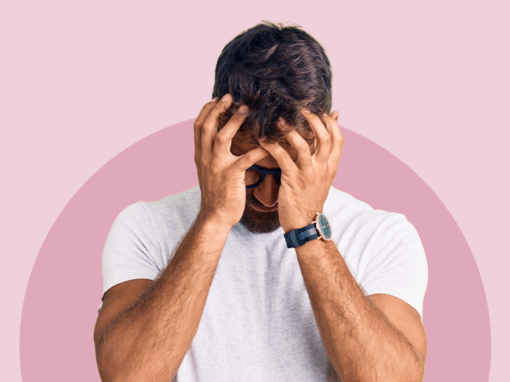Stress vs. anxiety are often used interchangeably, but they are different experiences. Stress refers to the response to a perceived threat or demand, while anxiety is a feeling of apprehension or fear about a potential threat or future event.
This post will explain the difference between stress and anxiety while suggesting ways to manage them.
Overview
Stress and anxiety are different experiences that similarly affect our bodies and minds. Both can be managed with various approaches, including lifestyle changes, therapy, and medication. If stress or anxiety significantly impacts daily life, it is best to seek medical attention.
What Is Stress?
Stress is our natural response to various challenging situations such as public speaking, meeting deadlines, or facing financial difficulties. However, it may be caused by positive events as well. Stress can be beneficial in small amounts, helping us to focus and take action. However, chronic stress can lead to physical and mental health problems such as headaches, insomnia, and depression.
What Is Anxiety?
Anxiety is a feeling of unease, worry, or fear that a real or perceived threat can trigger. Anxiety can be experienced as a general feeling of unease or associated with specific situations or objects, such as social situations or flying on an aeroplane. Anxiety can be debilitating when excessive or persistent.
What’s The Difference Between Stress and Anxiety?
Stress and anxiety are related experiences, but they are different in their nature and triggers. Stress is a response to a specific external demand or pressure, such as a work deadline or a traffic jam, while anxiety is a more generalised feeling of worry or fear about something less likely to happen in the future. So, what is the difference between stress and anxiety?
Stress is a natural and helpful response that helps us meet challenges and cope with demands. It can encourage us to take the correct action and get things done. However, when stress becomes overwhelming and chronic, it can lead to emotional and physical exhaustion and negative health consequences.
On the other hand, anxiety is a more persistent and often irrational worry or fear that various stimuli, such as social situations, uncertainty, or past traumatic experiences, can trigger. Unlike feeling stress, anxiety may not have a specific trigger, and the feeling can persist even when the perceived threat is not present.
Symptoms of Stress
Physical Symptoms:
Signs of stress can cause symptoms such as headaches, muscle tension, chest pain, and fatigue.
Emotional Symptoms:
Causes of stress can also impact emotional well-being and result in symptoms such as anxiety, irritability, mood swings, and depression.
Cognitive Symptoms:
Stress can affect cognitive function and lead to difficulty concentrating, forgetfulness, and confusion.
Behavioural Symptoms:
Stress can also affect behaviour and result in symptoms such as increased or decreased appetite, insomnia, hypersomnia, and restlessness.
Interpersonal Symptoms:
Stress symptoms can also impact interpersonal relationships, resulting in social withdrawal, increased conflicts, and difficulty communicating.
Symptoms of Anxiety
Excessive Worrying:
One of the primary symptoms of anxiety is excessive worrying or ruminating about past events, future possibilities, or present situations.
Restlessness:
Some anxiety causes may make people feel restless, jittery, or on edge.
Irritability:
Anxiety can cause irritability, mood swings, and difficulty regulating emotions.
Physical Symptoms:
Signs of anxiety can cause various physical symptoms, like sweating, rapid heartbeat, trembling, dizziness, nausea, and difficulty breathing.
Avoidance:
People with anxiety may also avoid situations that trigger their anxiety. This can include social situations, work-related tasks, or even leaving the house.
Stress and Anxiety Treatment / Management
Following are some ways to manage stress anxiety:
Exercise
Regular exercise is a great way to reduce anxiety and stress. Physical activity can help to release tension and boost mood-enhancing chemicals in the brain, such as endorphins. Aim to engage in moderate-intensity exercise most days of the week.
Relaxation Techniques
Various relaxation techniques, such as deep breathing, progressive muscle relaxation, and yoga, can aid in managing stress and anxiety. These techniques can help calm the mind and body and promote relaxation and well-being.
Cognitive Behavioral Therapy (CBT)
How to manage anxiety? CBT is a talk therapy that helps to identify and change our negative thinking patterns and behaviours contributing to anxiety. CBT can effectively treat anxiety disorders in individual or group settings.
Mindfulness Meditation
Mindfulness focuses on one’s present moment and accepting one’s thoughts and feelings without judgement. This practice can help to reduce stress, anxiety, depression by encouraging a sense of calm and perspective.
Medication
Anxiety and stress medicine may sometimes be prescribed to treat anxiety. Antidepressants, anti-anxiety medications, and beta-blockers are commonly used for managing stress and anxiety. However, medication should be used under the supervision of a medical professional.
Conclusion
Stress and anxiety are absolutely normal human reactions to worrying or threatening situations. They are our fight-or-flight reaction to keep us safe by preparing the body to deal with danger. Sometimes, stress and anxiety can overwhelm people. When this happens, it often leads to chronic anxiety or stress. There are several ways to reduce stress and anxiety, and anyone who finds stress or anxiety interferes with their everyday life may wish to speak to a doctor.
FAQs Related To Stress Vs. Anxiety
Is stress related to anxiety?
Yes, stress and anxiety are closely related. Stress is one’s reaction to a perceived threat, whether real or imagined. On the other hand, anxiety is a persistent feeling of worry, fear, or unease, often characterised by physical symptoms like sweating, rapid heartbeat, and trembling.
How does stress turn into anxiety?
Stress and anxiety are closely related, and chronic or excessive stress can develop anxiety. However, when we are exposed to chronic or excessive stress, our body may continue to produce cortisol, which can cause changes in the brain and body that contribute to the development of anxiety.
Is there a pill to reduce stress?
Some medications can be prescribed to help reduce stress and anxiety symptoms. These medications are often prescribed by a mental health professional, such as a psychiatrist, and should be used under their guidance.
This article is for informational purposes only and does not constitute medical advice. The information contained herein is not a substitute for and should never be relied upon for professional medical advice. Book a consultation with andSons medical team to learn more about healthcare treatments here.


